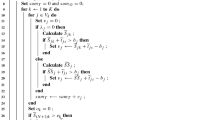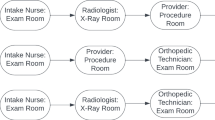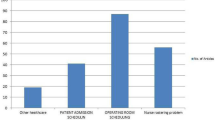Abstract
This paper discusses the surgery scheduling problem for single surgical suite subject to random emergency surgery. In a surgical suite, each patient should be treated by three stages in the same order. This problem can be handled as a no-wait permutation flow-shop scheduling problem with three machines. A predictive-reactive scheduling approach is developed to accommodate the influence of surgery’s arrival on planned schedule while optimizing the objective of combining efficiency and stability. In the predictive scheduling phase, an initial schedule is generated by solely optimizing the efficiency, and then slack time is inserted in the initial schedule to generate a planned schedule based on the occurrence probability of emergency surgery. In the reactive scheduling phase, a “break-in-moment” of emergency surgery is determined to satisfy the requirement of non-preemption surgery and the no-wait constraint. A partial-rescheduling approach is used to revise the schedule of unperformed surgeries after an emergency surgery certainly breaks in the planned schedule. A computational experiment was conducted and the computational results demonstrate that comparing with traditional approaches, the predictive-reactive scheduling approach developed here could significantly improve the stability with a little sacrifice in the efficiency for all tested instances.




Similar content being viewed by others
References
Cardoen B, Demeulemeester E, Beliën J (2010) Operating room planning and scheduling: a literature review. Eur J Oper Res 201(3):921–932
Choi BC, Leung JYT, Pinedo ML (2011) Minimizing makespan in an ordered flow shop with machine-dependent processing times. J Comb Optim 22(4):797–818
Dong J, Chen Y, Zhang A, Yang Q (2013) A new three-machine shop scheduling: complexity and approximation algorithm. J Comb Optim 26(4):799–810
Fei H, Chu C, Meskens N, Artiba A (2008) Solving surgical cases assignment problem by a branch-and-price approach. Int J Prod Econ 112(1):96–108
Fei H, Meskens N, Chu C (2010) A planning and scheduling problem for an operating theatre using an open scheduling strategy. Comput Ind Eng 58(2):221–230
Guinet A, Chaabane S (2003) Operating theatre planning. Int J Prod Econ 85(1):69–81
Hans E, Wullink G, Van Houdenhoven M, Kazemier G (2008) Robust surgery loading. Eur J Oper Res 185(3):1038–1050
Hsu VN, de Matta R, Lee CY (2003) Scheduling patients in an ambulatory surgical center. Nav Res Log 50(3):218–238
Lambrechts O, Demeulemeester E, Herroelen W (2011) Time slack-based techniques for robust project scheduling subject to resource uncertainty. Ann Oper Res 186(1):443–464
Lamiri M, Xie X, Dolgui A, Grimaud F (2008) A stochastic model for operating room planning with elective and emergency demand for surgery. Eur J Oper Res 185(3):1026–1037
Lee S, Yih Y (2014) Reducing patient-flow delays in surgical suites through determining start-times of surgical cases. Eur J Oper Res 238(2):620–629
Li Q, Wang B, Wang X (2012) Predictable scheduling approach for single machine subject to random machine breakdown. Syst Eng Theory Pract 31(12):2387–2393
Macario A, Vitez T, Dunn B, McDonald T (1996) Where are the costs in perioperative care? Analysis of hospital costs and charges for inpatient surgical care. Surv Anesthesiol 40(5):283
Mannino C, Nilssen EJ, Nordlander TE (2012) A pattern based, robust approach to cyclic master surgery scheduling. J Sched 15(5):553–563
Mehta SV (1999) Predictable scheduling of a single machine subject to breakdowns. Int J Comput Integr Manuf 12(1):15–38
Mehta SV, Uzsoy RM (1998) Predictable scheduling of a job shop subject to breakdowns. IEEE Trans Robot Automat 14(3):365–378
Pan Q, Tasgetiren MF, Liang Y (2008) A discrete particle swarm optimization algorithm for the no-wait flowshop scheduling problem. Comput Oper Res 35(9):2807–2839
Pan Q, Wang L, Qian B (2009) A novel differential evolution algorithm for bi-criteria no-wait flow shop scheduling problems. Comput Oper Res 36(8):2498–2511
Pan Q, Wang L, Gao L, Li W (2011) An effective hybrid discrete differential evolution algorithm for the flow shop scheduling with intermediate buffers. Inf Sci 181(3):668–685
Pham DN, Klinkert A (2008) Surgical case scheduling as a generalized job shop scheduling problem. Eur J Oper Res 185(3):1011–1025
Rachuba S, Werners B (2013) A robust approach for scheduling in hospitals using multiple objectives. J Oper Res Soc 65(4):546–556
Röck H (1984) The three-machine no-wait flow shop is NP-complete. J ACM 31(2):336–345
Sabuncuoglu I, Bayız M (2000) Analysis of reactive scheduling problems in a job shop environment. Eur J Oper Res 126(3):567–586
Saremi A, Jula P, ElMekkawy T, Wang GG (2013) Appointment scheduling of outpatient surgical services in a multistage operating room department. Int J Prod Econ 141(2):646–658
Stuart K, Kozan E (2012) Reactive scheduling model for the operating theatre. Flex Serv Manuf J 24(4):400–421
Van Essen J, Hans E, Hurink J, Oversberg A (2012) Minimizing the waiting time for emergency surgery. Oper Res Health Care 1(2):34–44
Wang B, Xi Y (2006) Rolling partial rescheduling with dual objectives for single machine subject to disruptions. Acta Autom Sin 32(5):667
Wu SD, Storer RH, Pei-Chann C (1993) One-machine rescheduling heuristics with efficiency and stability as criteria. Comput Oper Res 20(1):1–14
Wullink G, Van Houdenhoven M, Hans EW, Van Oostrum JM, Van der Lans M, Kazemier G (2007) Closing emergency operating rooms improves efficiency. J Med Syst 31(6):543–546
Yang B, Geunes J (2008) Predictive-reactive scheduling on a single resource with uncertain future jobs. Eur J Oper Res 189(3):1267–1283
Zhong L, Luo S, Wu L, Xu L, Yang J, Tang G (2014) A two-stage approach for surgery scheduling. J Comb Optim 27(3):545–556
Acknowledgments
B. Wang is supported by National Natural Science Foundation of China Grant 60874076. X. Zhang is supported by National Natural Science Foundation of China Grant 61273182.
Author information
Authors and Affiliations
Corresponding author
Rights and permissions
About this article
Cite this article
Wang, B., Han, X., Zhang, X. et al. Predictive-reactive scheduling for single surgical suite subject to random emergency surgery. J Comb Optim 30, 949–966 (2015). https://doi.org/10.1007/s10878-015-9861-2
Published:
Issue Date:
DOI: https://doi.org/10.1007/s10878-015-9861-2




